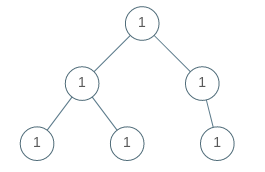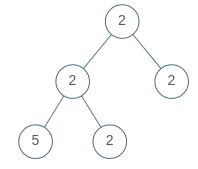Tree
Depth-First Search
Breadth-First Search
Binary Tree
Description
A binary tree is uni-valued if every node in the tree has the same value.
Given the root of a binary tree, return true if the given tree is uni-valued , or false otherwise.
Example 1:
Input: root = [1,1,1,1,1,null,1]
Output: true
Example 2:
Input: root = [2,2,2,5,2]
Output: false
Constraints:
The number of nodes in the tree is in the range [1, 100].
0 <= Node.val < 100
Solutions
Solution 1
Python3 Java C++ Go TypeScript Rust
1
2
3
4
5
6
7
8
9
10
11
12
13
14 # Definition for a binary tree node.
# class TreeNode:
# def __init__(self, val=0, left=None, right=None):
# self.val = val
# self.left = left
# self.right = right
class Solution :
def isUnivalTree ( self , root : TreeNode ) -> bool :
def dfs ( node ):
if node is None :
return True
return node . val == root . val and dfs ( node . left ) and dfs ( node . right )
return dfs ( root )
1
2
3
4
5
6
7
8
9
10
11
12
13
14
15
16
17
18
19
20
21
22
23
24
25
26
27 /**
* Definition for a binary tree node.
* public class TreeNode {
* int val;
* TreeNode left;
* TreeNode right;
* TreeNode() {}
* TreeNode(int val) { this.val = val; }
* TreeNode(int val, TreeNode left, TreeNode right) {
* this.val = val;
* this.left = left;
* this.right = right;
* }
* }
*/
class Solution {
public boolean isUnivalTree ( TreeNode root ) {
return dfs ( root , root . val );
}
private boolean dfs ( TreeNode root , int val ) {
if ( root == null ) {
return true ;
}
return root . val == val && dfs ( root . left , val ) && dfs ( root . right , val );
}
}
1
2
3
4
5
6
7
8
9
10
11
12
13
14
15
16
17
18
19
20
21
22 /**
* Definition for a binary tree node.
* struct TreeNode {
* int val;
* TreeNode *left;
* TreeNode *right;
* TreeNode() : val(0), left(nullptr), right(nullptr) {}
* TreeNode(int x) : val(x), left(nullptr), right(nullptr) {}
* TreeNode(int x, TreeNode *left, TreeNode *right) : val(x), left(left), right(right) {}
* };
*/
class Solution {
public :
bool isUnivalTree ( TreeNode * root ) {
return dfs ( root , root -> val );
}
bool dfs ( TreeNode * root , int val ) {
if ( ! root ) return true ;
return root -> val == val && dfs ( root -> left , val ) && dfs ( root -> right , val );
}
};
1
2
3
4
5
6
7
8
9
10
11
12
13
14
15
16
17
18 /**
* Definition for a binary tree node.
* type TreeNode struct {
* Val int
* Left *TreeNode
* Right *TreeNode
* }
*/
func isUnivalTree ( root * TreeNode ) bool {
var dfs func ( * TreeNode ) bool
dfs = func ( node * TreeNode ) bool {
if node == nil {
return true
}
return node . Val == root . Val && dfs ( node . Left ) && dfs ( node . Right )
}
return dfs ( root )
}
1
2
3
4
5
6
7
8
9
10
11
12
13
14
15
16
17
18
19
20
21
22
23
24 /**
* Definition for a binary tree node.
* class TreeNode {
* val: number
* left: TreeNode | null
* right: TreeNode | null
* constructor(val?: number, left?: TreeNode | null, right?: TreeNode | null) {
* this.val = (val===undefined ? 0 : val)
* this.left = (left===undefined ? null : left)
* this.right = (right===undefined ? null : right)
* }
* }
*/
function isUnivalTree ( root : TreeNode | null ) : boolean {
const val = root . val ;
const dfs = ( root : TreeNode | null ) => {
if ( root == null ) {
return true ;
}
return root . val === val && dfs ( root . left ) && dfs ( root . right );
};
return dfs ( root . left ) && dfs ( root . right );
}
1
2
3
4
5
6
7
8
9
10
11
12
13
14
15
16
17
18
19
20
21
22
23
24
25
26
27
28
29
30
31
32
33 // Definition for a binary tree node.
// #[derive(Debug, PartialEq, Eq)]
// pub struct TreeNode {
// pub val: i32,
// pub left: Option<Rc<RefCell<TreeNode>>>,
// pub right: Option<Rc<RefCell<TreeNode>>>,
// }
//
// impl TreeNode {
// #[inline]
// pub fn new(val: i32) -> Self {
// TreeNode {
// val,
// left: None,
// right: None
// }
// }
// }
use std :: rc :: Rc ;
use std :: cell :: RefCell ;
impl Solution {
fn dfs ( val : i32 , root : & Option < Rc < RefCell < TreeNode >>> ) -> bool {
if root . is_none () {
return true ;
}
let root = root . as_ref (). unwrap (). borrow ();
root . val == val && Self :: dfs ( val , & root . left ) && Self :: dfs ( val , & root . right )
}
pub fn is_unival_tree ( root : Option < Rc < RefCell < TreeNode >>> ) -> bool {
let root = root . as_ref (). unwrap (). borrow ();
Self :: dfs ( root . val , & root . left ) && Self :: dfs ( root . val , & root . right )
}
}
GitHub


